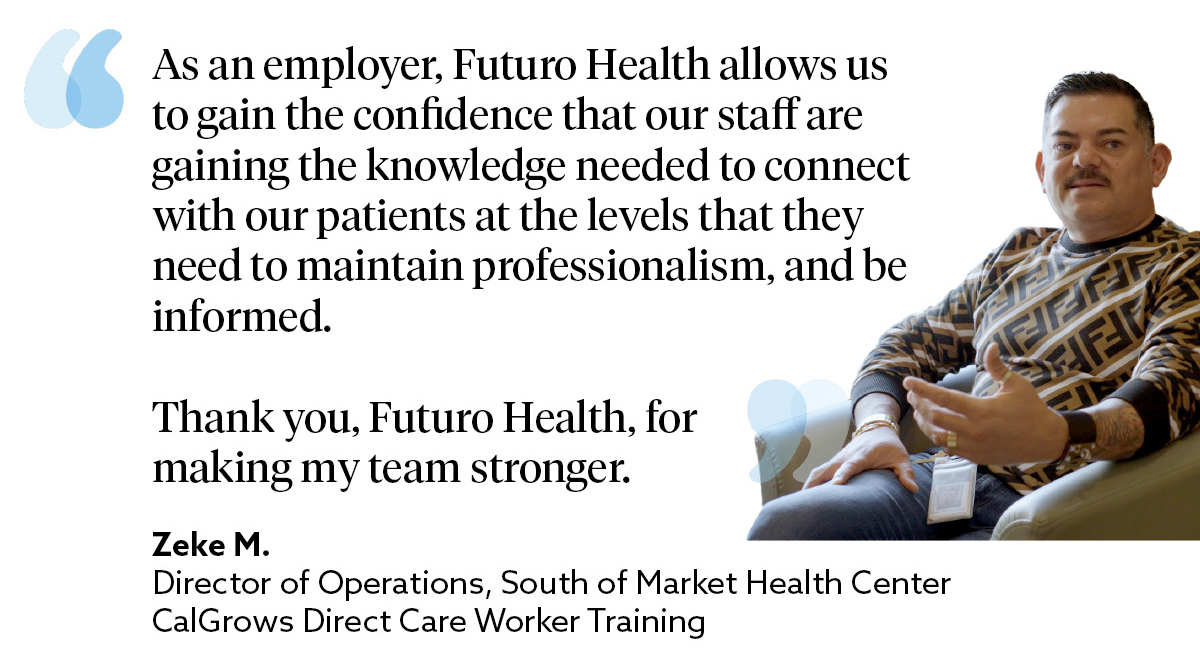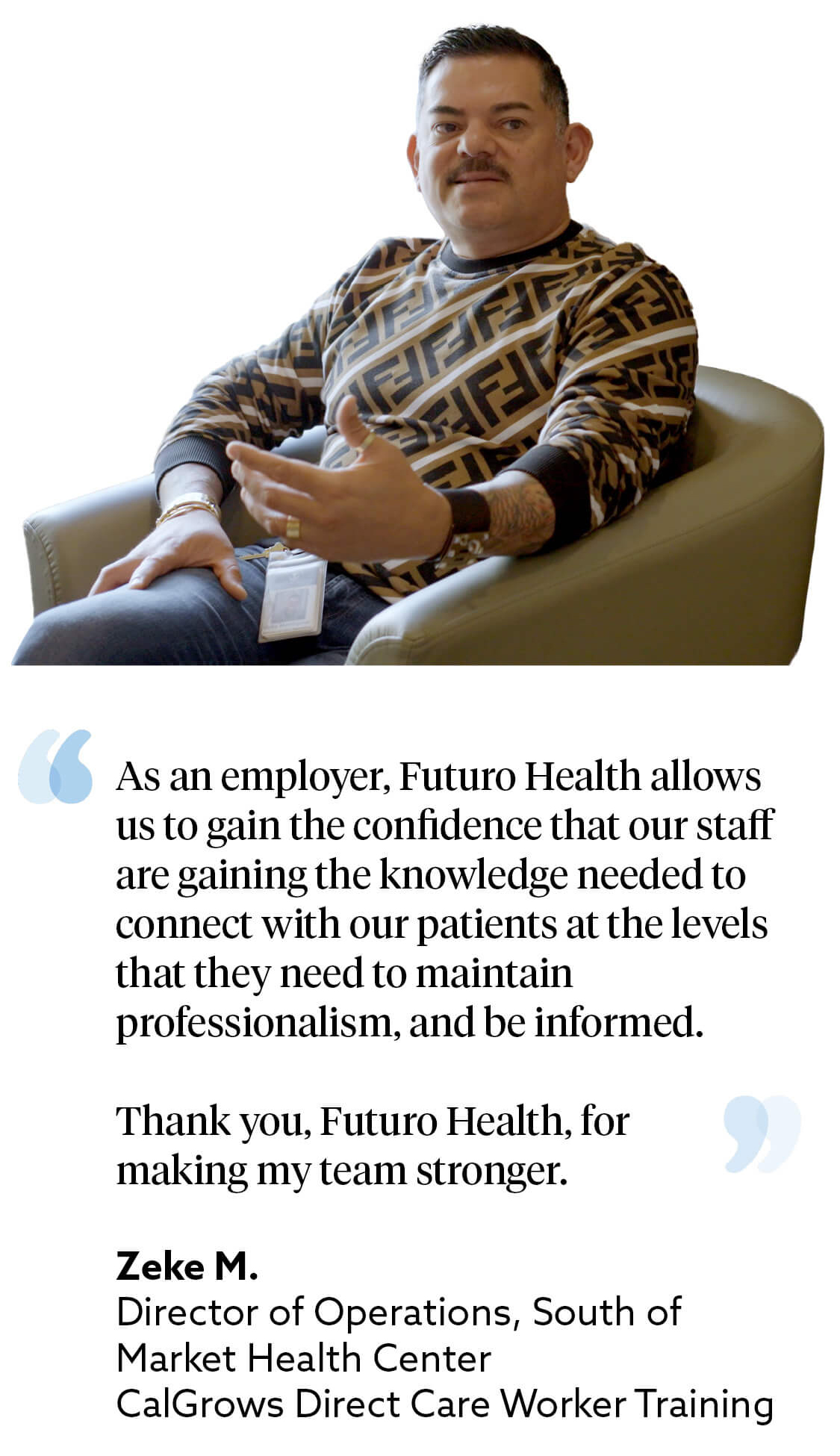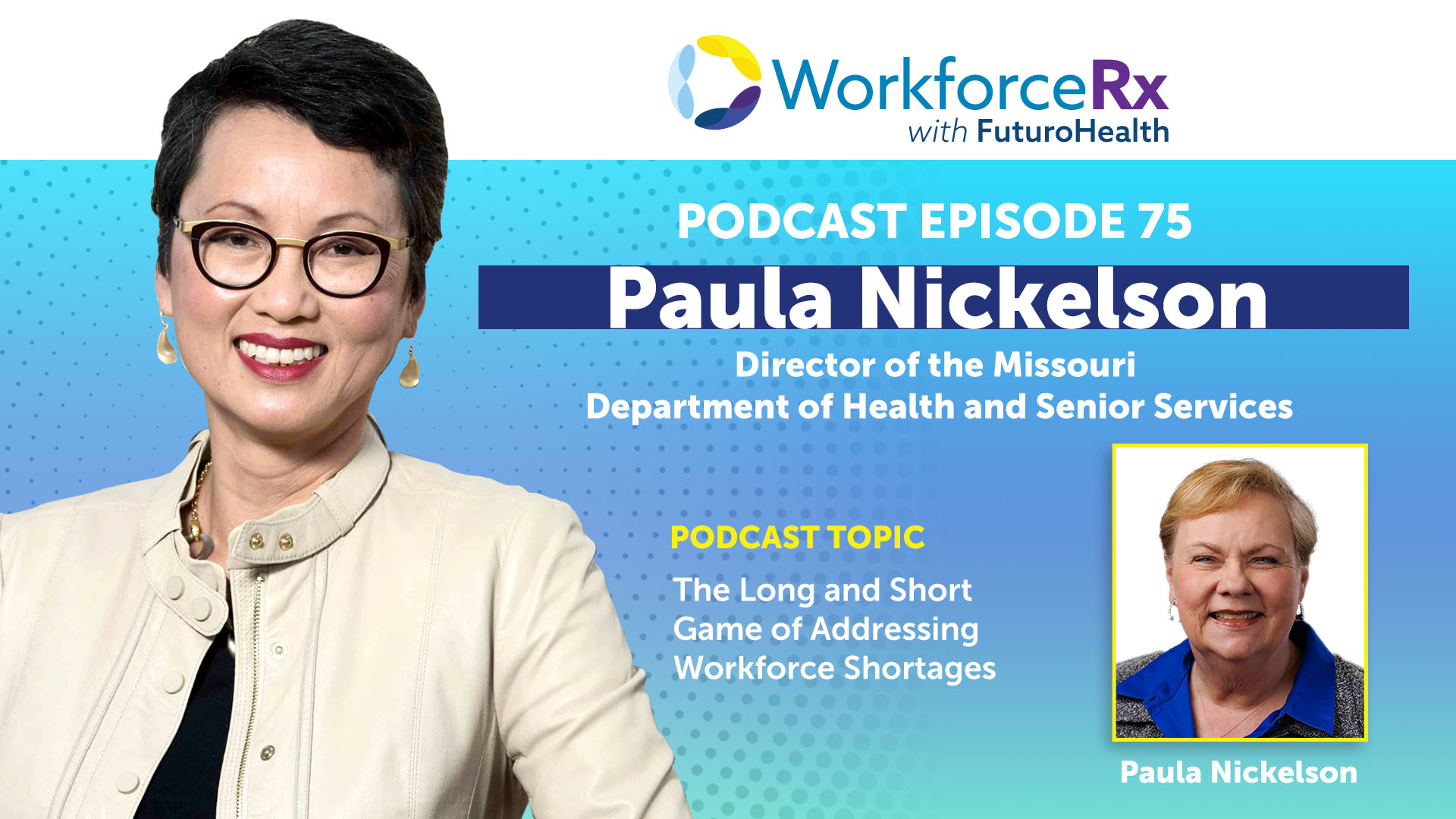| |
eConnection January 2024
| eConnection January 2024 |
| | | |
- Feature Story: Help Wanted by Healthcare Employers
- Our Latest Blog: Everything everywhere all at once: the proliferation of healthcare worker shortages
- Current Open Programs, Scholarships Available … Please Share!
- Futuro Health Scholar Spotlight
- Meet our Futuro Health Scholar Support Team
- Futuro Health in the News
- WorkforceRx Podcast: Paula Nickelson, Director of the Missouri Department of Health and Senior Services: The Long and Short Game of Addressing Workforce Shortages
| | | |
Help Wanted by Healthcare Employers
|
As healthcare’s critical shortage of workers grows, it is causing significant repercussions for employers across the spectrum, from large hospital systems to community clinics, medical practice groups, and specialty care providers. Patients are experiencing extended wait times for appointments, delayed procedures, and a restricted availability of healthcare providers, which adversely affect patient outcomes. Most health systems have begun some effort to connect with high schools as a feeder. Bloomberg Philanthropy recently announced $250 million towards this important initiative. And yet, considering the declining K-12 population, the result will not be enough.
Talent acquisition efforts remain fiercely competitive among healthcare providers. Faced with a talent puddle, employers continue to compete for the same pool of candidates, putting smaller or financially less endowed providers who often serve communities most in need of care, at a disadvantage. If there were a shift in behavior among healthcare providers to be desired, it would be to move away from this competitive approach and start collaborating on common workforce development challenges. Futuro Health is a key resource in addressing the nationwide shortage of allied healthcare workers by forming strategic partnerships with healthcare employers, emphasizing collaboration over competition to build a reliable, quality, and diverse talent pool, particularly in allied roles that make up 60-65% of the healthcare workforce.
|  |  |
Futuro Health employer partners include major providers such as Kaiser Permanente, Stanford Health Care, Lucile Packard Children’s Hospital Stanford, Dignity Health, Sutter Health as well as smaller providers including community-based organizations and FQHCs. Futuro Health has extended the impact of its nonprofit mission through other resources and grants, including partnering with the California Department of Aging (CDA) on the CalGrows program to support in-home and community-based caregivers of older adults and people with disabilities by providing training, incentives, and a career path for the future.
A crucial element of these partnerships is the emphasis on engaging untapped talents and equipping them with the credentials to enter healthcare. Since launching in 2020, Futuro Health has provided allied health career training to more than 14,635 diverse individuals, of whom 8,415 enrolled in an education journey to pursue roles such as medical assistants, pharmacy techs, sterile processing techs, surgical techs, phlebotomists, peer support specialists, and more in-demand roles. All Futuro Health Scholars experience Futuro Health’s unique Human Touch Healthcare(tm) coursework before entering the technical leg of their education journey. And, every Scholar receives Success Coaching, starting as early as 24-hours after they submit a simple online application.
By aligning education and training programs with the needs of healthcare employers – and shifting from having employers compete to instead collaborate, Futuro Health accelerates the process of filling healthcare jobs but also enhances the quality of care provided by professionals entering the workforce.
If you are a healthcare provider seeking to better your organization under these best practices in workforce development, contact us at partnership@futurohealth.org. | | | |
Our Latest Blog: Everything everywhere all at once: the proliferation of healthcare worker shortages
By Van Ton-Quinlivan, CEO, Futuro Health |
 | | |
We need to own up to some hard truths. It’s getting dire out here. There are pervasive shortages in healthcare workers across the spectrum. It doesn’t matter what state or country you’re in, or what field - there is a shortage of these essential workers. It was a pattern I heard while speaking at the World Health Organization and the National Governors Association and something I observed in my role as chair of the California Workforce Healthcare Education and Training Council. Just look at California alone. Does California have a shortage of primary care doctors? Yes. A shortage of specialty nurses? Yes. A shortage of workers in allied health roles? Yes again. How about a shortage of workers in oral health roles? Yes. And what about a shortage of mental and behavioral healthcare workers? Yes, in this field as well. However, California is not the only place experiencing this.
In fact, California is a microcosm of this trend that is not only national but global as well. In the U.S., “On the mental and behavioral health front alone, it would take 77,000 more school counselors, 63,000 more school psychologists and probably tens of thousands of school social workers to reach levels recommended by professional groups before the pandemic hit,” according to a recent article in the Washington Post. “Typically, the jobs require a master’s degree, meaning six or seven years of higher education. The pipeline does not flow rapidly.”
In the meanwhile, communities – from children to adults - struggle. |
| Read The Complete Blog Here | |
| | Programs Open for Enrollment, Scholarships Available...Please Share! |
| | | | | |
| |
|
Futuro Health Scholar Spotlight
| | | Javier S.
Futuro Health Scholar
Employed as a phlebotomist at Wellness Med, Stockton, CA |  |
Javier had been working in a warehouse for 14 years when a friend told him about Futuro Health. After three months of online courses, followed by hands-on training, he graduated and is now a phlebotomist working for Wellness Med in Stockton, California. Javier’s new job affords him more time with his family—enough so that he now coaches his kids’ baseball teams. He aspires to become a Licensed Vocational Nurse (LVN) or Registered Nurse (RN) one day. “Since I became a phlebotomist, I’ve been so happy. I love the job. There are more opportunities to grow.” |
| Watch His Story | | |
|
Meet our Futuro Health Scholar Support Team
| | | The Futuro Health Scholar Support Team, including Success Coaches, Outreach Team Members and Facilitators, are dedicated to supporting our Scholars in their educational journey towards a fulfilling career in healthcare. We understand that each Scholar has unique needs and challenges, and we're here to provide personalized coaching and goal setting to help them succeed. We're committed to celebrating their achievements along the way and working together to overcome any obstacles they may encounter.
| | | |
| | Futuro Health in the News | | | | | | | | | |
| | WorkforceRx Podcast |
 |
Paula Nickelson, Director of the Missouri Department of Health and Senior ServicesEpisode #75: The Long and Short Game of Addressing Workforce Shortages
State departments of health play a huge role in America's healthcare system, with responsibility for public health, licensure, public policy, and much more, so the workforce challenges they face have broad implications. “It will probably be twenty years before we really begin to bend the curve because many of the workforce shortages we encounter require very long-term strategies to change,” says Paula Nickelson, Director of the Missouri Department of Health and Senior Services. Expanding slots for physician residencies and training opportunities for Certified Nursing Assistants are just two of the steps being pursued. Student loan reform, synching up higher ed with the needs of employers and better data management are also on her list but, as she tells Futuro Health CEO Van Ton-Quinlivan, Nickelson thinks these types of changes will not improve healthcare as much as a major shift toward prevention would. “We will never change our health indicators in a positive way, nor will we get out of the escalating spiral of acute care costs and long-term care costs, until we invest in public health and prevention.” This episode of WorkforceRx promises an insightful state-level perspective on workforce and health system challenges confronting the entire nation.
|
| Listen To The Latest Podcast
| | | |
About Futuro Health
Futuro Health is a non-profit organization focused on improving the health and wealth of communities by growing the largest network of healthcare workers in the nation.
Futuro Health makes education journeys into allied health careers possible by growing the talent that employers need and creating a path to opportunity that workers want. | | | |
Subscribe to
Futuro Health eConnection
| | Subscribe |
If this eConnection was forwarded to you, please subscribe if you’d like future editions to land in your inbox. | | | |
|